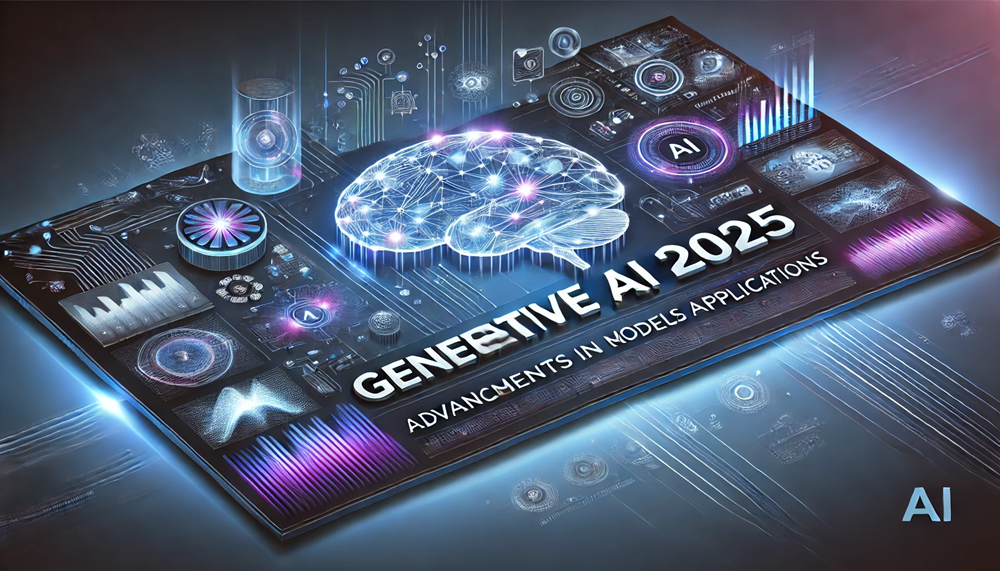Introduction: How Generative AI is Evolving in 2025
The Generative AI revolution is moving at an unprecedented pace, transforming industries with smarter, more creative, and highly adaptive AI models. In 2025, Generative AI is no longer just about text or image generation—it’s powering hyper-realistic video synthesis, AI-generated music, fully autonomous chatbots, and even scientific discoveries.
With leading AI research labs like OpenAI, Google DeepMind, and Meta AI pushing the boundaries, new breakthroughs in AI models are enabling businesses, creatives, and developers to achieve previously unimaginable feats.
But what exactly has changed in Generative AI in 2025? How are businesses leveraging new AI models to enhance productivity, creativity, and automation? Let’s explore the most significant advancements in Generative AI and its real-world applications.
Major Advancements in Generative AI Models in 2025
The AI models of 2025 are significantly more powerful than their predecessors, offering higher accuracy, creativity, and adaptability across multiple domains.
1. Multimodal AI Models: Text, Image, Audio & Video Combined
✔ AI models like OpenAI’s GPT-5 and Google Gemini Ultra can now process and generate text, images, videos, and audio simultaneously.
✔ These multimodal AI systems allow for seamless interaction between different content types, making AI assistants more versatile.
🚀 Example: Users can upload an image, ask for AI-generated descriptions, and get a matching video and soundtrack all within seconds.
2. AI-Powered Video Generation: From Text to Film in Minutes
✔ AI video models like Sora by OpenAI and Runway Gen-3 can generate ultra-realistic video clips from simple text prompts.
✔ Filmmakers and content creators are using AI for automated CGI, virtual production, and AI-generated actors.
🚀 Example: Marketing agencies now create entire ad campaigns using AI-generated actors, backgrounds, and voiceovers—without traditional video production costs.
3. Generative AI for Code Development & Software Engineering
✔ AI coding models like Codex 2.0, GitHub Copilot X, and Google AlphaCode 2 are building applications with minimal human intervention.
✔ AI can now debug, optimize, and even generate complex software architectures, speeding up development.
🚀 Example: A startup can launch a fully functioning web app in a day using AI-generated code with minimal human input.
4. AI in Music & Sound Design: Composing Entire Albums
✔ AI models like Google MusicLM, AIVA, and HarmonAI can now generate full-length songs, instrumentals, and even remixes with human-like precision.
✔ Musicians use AI tools to experiment with new sounds, generate lyrics, and compose music across genres.
🚀 Example: AI-generated music is now being licensed for films, ads, and games, reducing production costs for creative professionals.
5. Generative AI in Scientific Discovery & Drug Development
✔ AI is now being used to generate new chemical compounds, simulate protein folding, and assist in drug discovery.
✔ Scientists are leveraging AI to predict new materials and accelerate vaccine development.
🚀 Example: AI-generated protein structures are helping researchers develop life-saving drugs faster than ever before.
Top Applications of Generative AI in 2025
Generative AI is no longer just about automating content creation—it’s transforming industries, enhancing productivity, and reshaping the future of work.
1. AI in Marketing & Content Creation
✔ AI-generated ads, videos, and blogs allow brands to scale content production effortlessly.
✔ Platforms like ChatGPT-5, Jasper AI, and Copy.ai automate marketing campaigns with personalized AI-generated copywriting.
2. AI-Powered Virtual Assistants & Customer Support
✔ AI chatbots like Google Bard Ultra, OpenAI ChatGPT-5, and Meta AI Assistants are handling entire customer support operations.
✔ These AI models can engage in lifelike conversations, troubleshoot issues, and even upsell products.
3. AI in Gaming & Virtual Reality
✔ Game developers are using AI to generate characters, storylines, and entire game environments.
✔ AI-driven NPCs (Non-Playable Characters) now engage in dynamic, realistic conversations.
4. AI in Legal & Finance Industries
✔ AI is automating contract generation, fraud detection, and legal research.
✔ Financial AI tools can analyze massive datasets to provide real-time trading insights and risk assessments.
5. AI in Healthcare: Revolutionizing Patient Care
✔ AI models assist radiologists in medical imaging analysis.
✔ AI-generated medical reports speed up diagnoses, helping doctors make faster decisions.
Challenges & Ethical Considerations in Generative AI
While Generative AI is evolving rapidly, it still presents several ethical, legal, and technical challenges.
1. Deepfake & AI Misinformation Risks
✔ With AI generating hyper-realistic videos and voices, misinformation and deepfake fraud are increasing concerns.
✔ Regulations are being proposed to prevent AI misuse in media and politics.
2. AI Copyright & Intellectual Property Issues
✔ AI models often generate content based on existing datasets—raising concerns about copyright infringement.
✔ Legal frameworks are still catching up on who owns AI-generated content.
3. AI Replacing Human Jobs
✔ AI is automating roles in marketing, customer support, and creative industries.
✔ The future workforce must adapt to AI-driven tools rather than compete against them.
🚨 Example: In 2025, several media companies replaced human writers with AI-driven news generators, reducing staff costs.
The Future of Generative AI Beyond 2025
✔ Hyper-Personalized AI Assistants – AI models will become personalized digital assistants that understand user preferences, habits, and workflows.
✔ AI-Generated Virtual Worlds – AI will create entirely simulated virtual environments for gaming, training, and collaboration.
✔ AI & Human Collaboration – Instead of replacing humans, AI will work alongside professionals as a creative and analytical assistant.
The AI industry is shifting from automation to augmentation, helping people achieve more with AI rather than replacing human expertise.
Conclusion: Generative AI in 2025 is Changing the World
✔ AI-generated text, video, and music are revolutionizing content creation.
✔ Businesses are integrating AI-driven solutions to enhance productivity.
✔ Scientific breakthroughs are accelerating due to AI-generated discoveries.
While Generative AI continues to push boundaries, the key to success will be responsible AI usage, ethical regulations, and human-AI collaboration.
